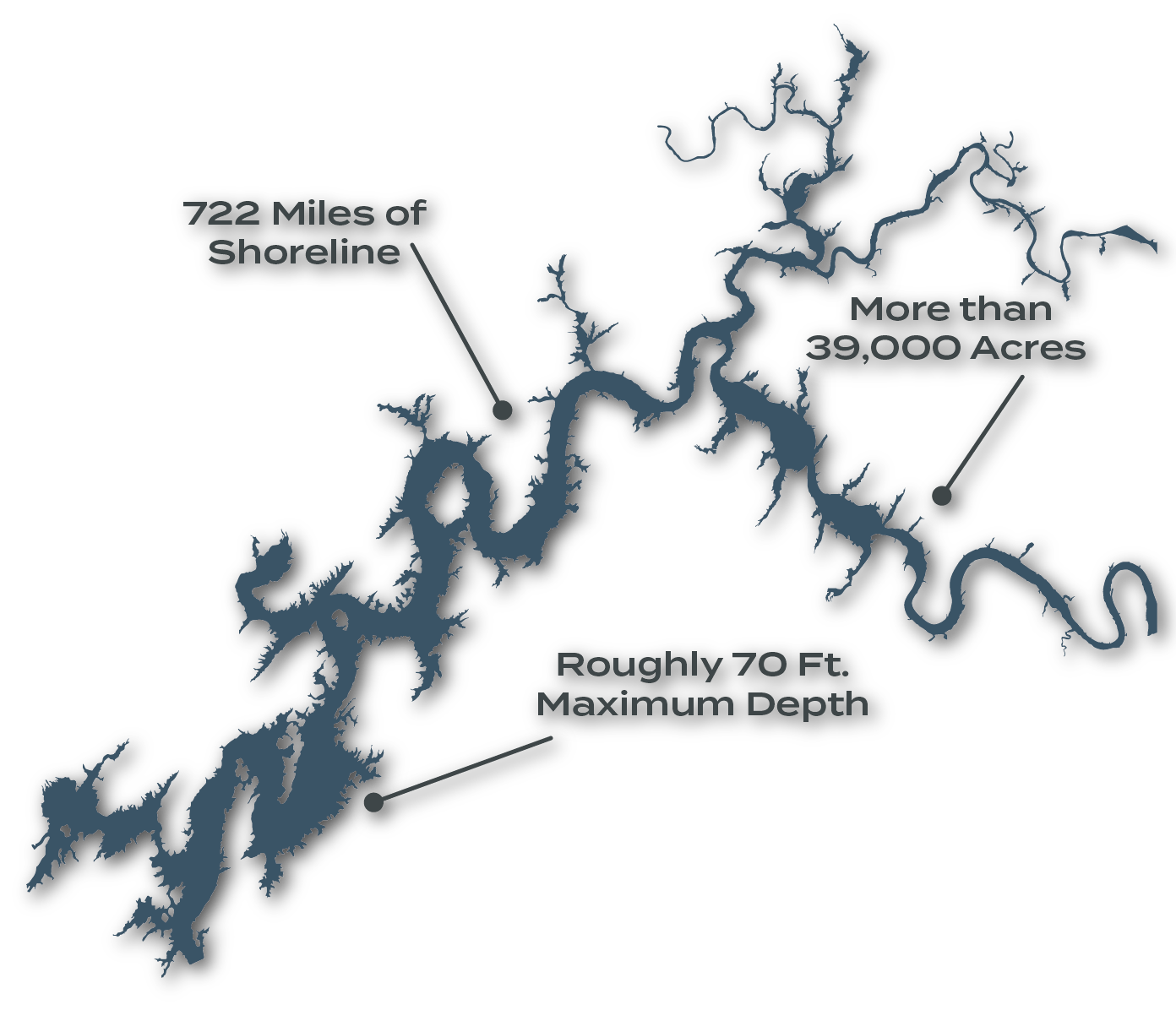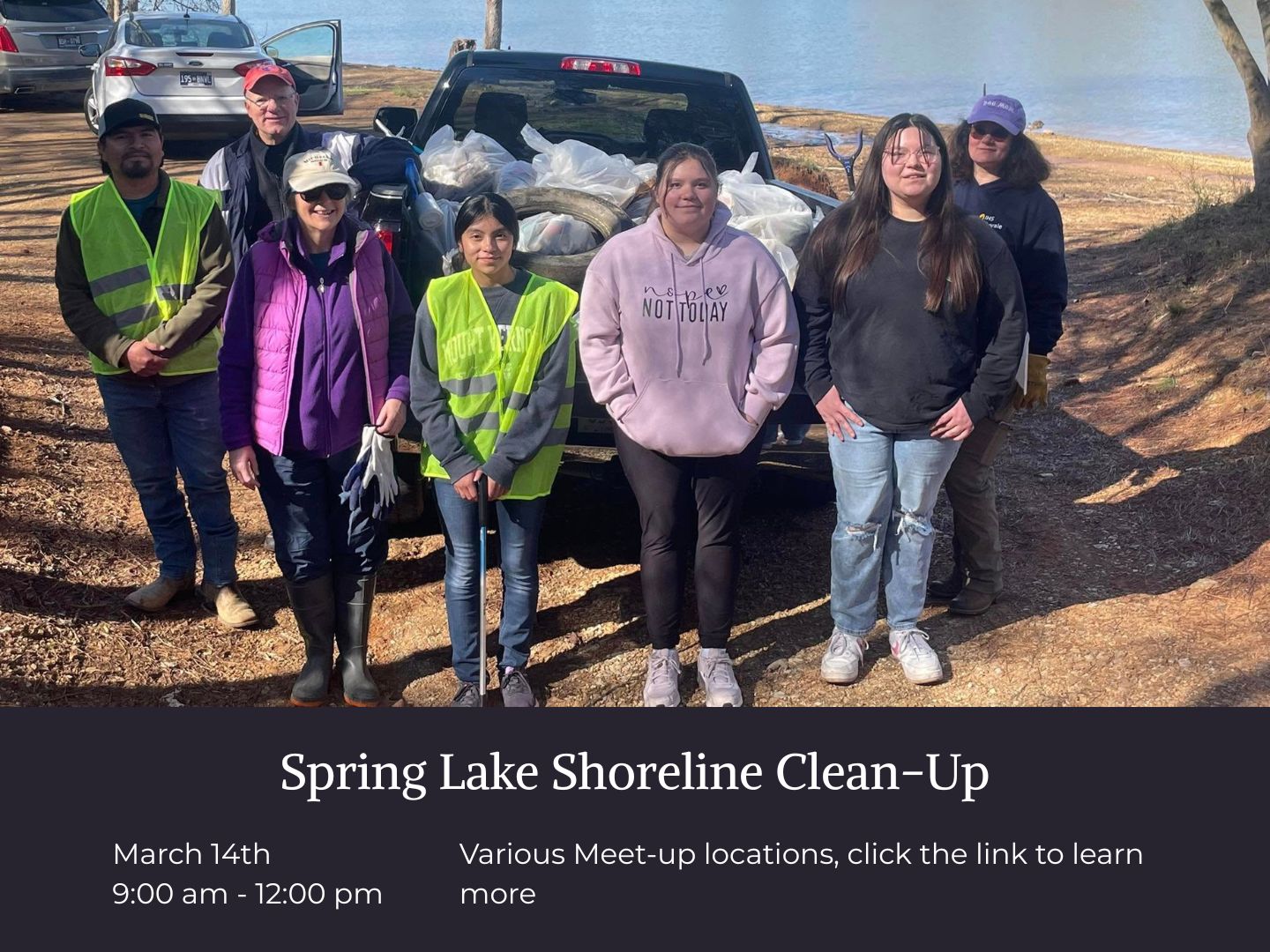Watts Bar Lake Information and Resources
The Watts Bar Lake Association was created in 1998 with a grand mission! We wanted to serve our lovely lake community in three ways; Education, Advocation, and Celebration. We educate on safety, current events, and ecology. We advocate for state and federal resources that help keep our lake healthy and enjoyable. We celebrate our lake’s beauty and the community that surrounds it by hosting cleanups and events.
Events
Become a member
Follow Us
Upcoming Events
Annual Shoreline Clean-Up
Location: Watts Bar Lake (various meet-up spots, click below for more information)
March 14, 2026
9:00 am – 12:00 pm
We Have the Power to Impact Our Future, and We’re Doing Something About It
The Mission of the Watts Bar Lake Association is to maintain, support, and protect the rights of lake property owners and lake users, provide educational services, and encourage and promote good and practical stewardship of Watts Bar Lake, including its ecology, water quality, resource management.
Watts Bar Lake in Tennessee is facing a significant problem with invasive aquatic plants, particularly Eurasian watermilfoil and hydrilla. These plants grow densely around boat docks, posing access problems for boaters and recreational users. The invasive species thrive in the Tennessee River due to the absence of natural predators and competition with native plants. This growth is expected to reach a point where up to 20% of the lake could be infested within the next few years.
Eurasian watermilfoil and hydrilla were introduced through the aquarium trade, and they have spread in the reservoirs along the Tennessee River. Hydrilla, in particular, has proven more problematic due to its ability to form thick underwater masses, reducing habitat for other aquatic life.
The Watts Bar Ecology and Fishery Council, established at the request of the Roane County Commission, has been advocating against the Tennessee Wildlife Resources Agency (TWRA) plan to prevent the invasion of silver carp into local lakes. Despite providing technical reports, scientific data, and expert opinions, the Council asserts that the TWRA’s plan of placing barriers behind the fish is inadequate and unsupported by scientific evidence. The Council argues that merely slowing down the progress of silver carp is insufficient, given the fish’s extensive takeover of various river basins. They emphasize the necessity of preventing silver carp from entering lakes in the first place.
The Council, led by a member with over 50 years of fisheries experience and supported by leading silver carp experts, recommends placing barriers at the Watts Bar and Chickamauga Locks to safeguard lakes such as Watts Bar, Melton Hill, Fort Loudon, and Tellico from economic and ecological devastation. They criticize TWRA for disregarding their expert advice and federal guidance, insisting that barriers behind the carp would escalate their movement toward the lakes and ensure significant damage. The Council urges individuals and businesses in the region to voice their concerns to political leaders, TWRA, the Tennessee Fish & Wildlife Commission, and Governor Bill Lee, stressing that proactive measures are essential to protect these lakes from invasive species and their impacts.
The Spring 2023 Watts Bar Lake Cleanup was highly successful, with significant participation from volunteers and key individuals. Rick Brown, Norm McCowan from Arrowhead Resort & Marina, and Jerry Nuneke played vital roles by offering their boats to transport trash. The cleanup effort involved 85 volunteers who collected 565 bags of trash, retrieved 78 tires, and recovered 6 mattresses from the lake. Various other items like furniture, chain-link fencing, and carpet were also removed, resulting in a total of over 11,000 pounds of collected trash. The event’s success was attributed to the support and resources provided by sponsors such as Watts Bar Lake Association, IJAMs Nature Center, TVA, Responsible Stewardship, and Tennessee Riverline. Additionally, Arrowhead Resort and Marina, along with Blue Springs Marina, contributed by providing lunch and hospitality, respectively.
FAQs
Is Watts Bar Lake man made?
Yes, Watts Bar Lake is a man-made reservoir. It is situated in eastern Tennessee and was created by the impoundment of the Tennessee River. The creation of Watts Bar Lake was the result of the construction of the Watts Bar Dam, which was begun in 1939 and completed in 1942 by the Tennessee Valley Authority (TVA). The primary purposes of the dam and reservoir are for hydroelectric power generation, flood control, and recreation. The reservoir covers an area of 39,090 acres and has become a popular spot for boating, fishing, and other water-based recreational activities. Learn More Here
Where is Watts Bar Lake?
Watts Bar Lake is located in eastern Tennessee, United States. The lake is situated southwest of Knoxville and northwest of Chattanooga. It runs along the Tennessee River and is one of the reservoirs created by the Tennessee Valley Authority (TVA) as part of its efforts for hydroelectric power generation, flood control, and recreational opportunities in the region.
How big is Watts Bar Lake?
Watts Bar Lake covers more than 39,000 acres, making it one of the largest reservoirs in Tennessee. It has over 720 miles of shoreline and extends across parts of Roane, Rhea, and Meigs County in eastern Tennessee.
How deep is Watts Bar Lake?
Watts Bar Lake has varying depths across its expanse. The average depth of the lake is around 19 feet (5.8 meters), and the maximum depth can reach up to approximately 70 feet (21 meters) in some areas. Keep in mind that these depths can change due to factors such as water levels, sediment accumulation, and other environmental factors.
What is Watts Bar Lake known for?
Watts Bar Lake is known for several things:
Recreation: The lake offers a wide range of recreational activities, including boating, fishing, swimming, water skiing, and camping. Its extensive shoreline and calm waters make it a popular destination for outdoor enthusiasts.
Fishing: The lake is known for its diverse fish population, including species like bass (largemouth, smallmouth, and spotted), crappie, catfish, and more. It’s a popular spot for fishing tournaments and angling enthusiasts.
Scenic Beauty: Watts Bar Lake is surrounded by picturesque landscapes, rolling hills, and wooded areas. It’s a scenic destination for those who enjoy nature, bird-watching, and photography.
Waterfront Communities: The lake’s shoreline is dotted with communities, marinas, and resorts that offer opportunities for lakeside living, vacation rentals, and waterfront dining.
Boating Events: The lake hosts various boating events, regattas, and boat shows throughout the year, drawing boaters and enthusiasts from the region.
Watts Bar Dam: The lake was created by the construction of Watts Bar Dam, which is also a notable feature in the area. The dam contributes to flood control, hydroelectric power generation, and recreational opportunities.
Tourism: Watts Bar Lake attracts tourists looking to relax by the water, explore the natural beauty, and engage in water-based activities.
Overall, Watts Bar Lake is a multifaceted destination known for its outdoor recreation, natural beauty, and the diverse experiences it offers to visitors and locals alike.
What are the boating laws on Watts Bar Lake?
Boating laws and regulations can vary based on the specific location and jurisdiction of the lake. However, for Watts Bar Lake, which is located in Tennessee, you can generally expect to follow the boating laws and regulations set forth by the Tennessee Wildlife Resources Agency (TWRA) and the Tennessee Valley Authority (TVA). Here are some common boating laws and regulations you might encounter on Watts Bar Lake:
Boating License: Tennessee law requires individuals born after January 1, 1989, to complete a boating education course and obtain a Boating Safety Education Certificate to operate a boat with more than 8.5 horsepower.
Boating Safety Equipment: You are required to have certain safety equipment on your boat, including life jackets, fire extinguishers, distress signals, navigation lights, and more. The specific requirements depend on the size of your boat and the type of watercraft you’re operating.
Speed Limits: There are specific speed limits in place for different areas of the lake, especially near shorelines, docks, and congested areas. Always follow posted speed limits and operate at a safe speed.
Reckless Operation: Boating under the influence (BUI) is illegal and can result in fines, imprisonment, or other penalties. Just like with driving, the legal blood alcohol concentration (BAC) limit for operating a boat is 0.08% in Tennessee.
Navigation Rules: Follow established navigation rules to avoid collisions and ensure the safety of all boaters. Yield the right of way as specified by these rules.
No-Wake Zones: Be aware of designated no-wake zones, which are areas where you must operate your boat at a slow speed to prevent creating a wake that could damage shoreline property or endanger other boaters.
Registration: All motorized boats must be registered with the TWRA. Display the registration number and validation decals as required.
Invasive Species Prevention: Boats should be cleaned, drained, and dried before launching to prevent the spread of invasive species like zebra mussels.
Personal Watercraft (PWC) Regulations: If you’re operating a personal watercraft, there may be additional regulations specific to PWCs, such as no-passing zones and following minimum safe distances from other vessels.
It’s important to review the specific regulations provided by the TWRA and TVA for Watts Bar Lake before heading out on the water. These regulations can change, and it’s your responsibility as a boater to stay informed and adhere to the rules for the safety of yourself, other boaters, and the environment. You can find detailed information on the TWRA and TVA websites or by contacting local authorities.
Click here for the TN Boating Handbook


